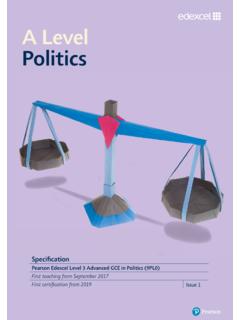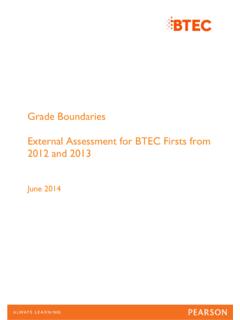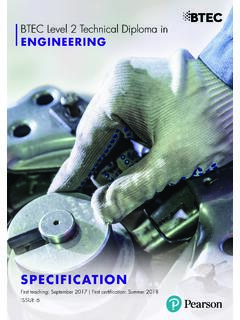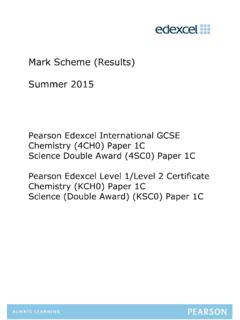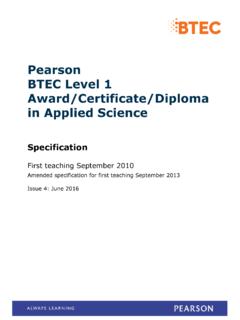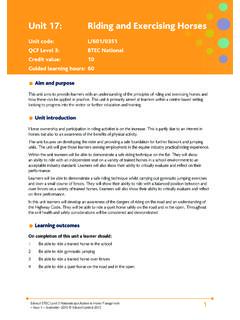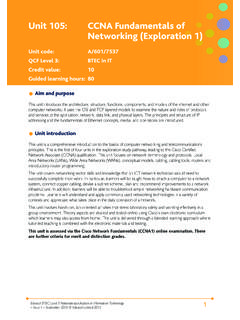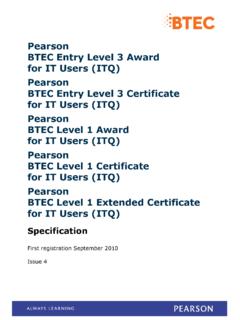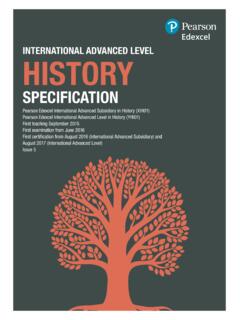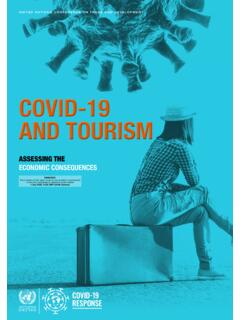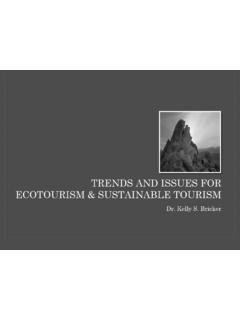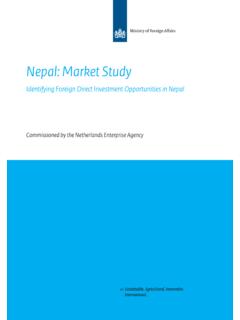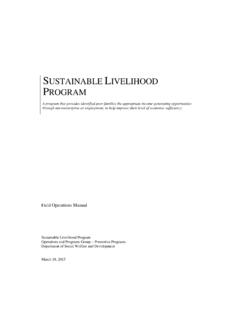Transcription of Unit 14: Specialist Tourism - Edexcel
1 1 Edexcel BTEC Level 3 Nationals specification in Travel and Tourism Issue 1 June 2010 Edexcel Limited 2010 unit 14: Specialist TourismUnit code: A/600/9499 QCF Level 3: BTEC NationalCredit value: 10 Guided learning hours: 60 Aim and purposeThe aim of this unit is to develop learners knowledge and understanding of the growth of the Specialist Tourism market and to apply their research skills by profiling a specific Specialist Tourism market . In addition, learners will develop their skills through planning a Specialist Tourism introductionLeisure Tourism has changed since mass market holiday products were introduced in the 1970s. Industries within the travel and Tourism sector need to reflect current trends and interests by changing products and services to meet the changing needs and expectations of customers, and remain profitable. Consequently the sector has responded to changing customer needs with the rapid growth of Specialist Tourism over the last decade.
2 UK holidaymakers seek out warmer climates because of the close proximity of sunny resorts in Europe and the ease of travel to world destinations. However, seeking a sun tan is no longer the sole motivation for taking a holiday. People are aware of the dangers of sunbathing and are more used to world travel as air travel has become quicker and cheaper. Many people take more holidays and short breaks rather than a two week annual sun holiday. Thus, holidays have to offer a different experience. The travel and Tourism sector now provides a plethora of Specialist Tourism products, sometimes tailor-made for the individual customer. This unit enables learners to explore this important growth market which combines hobbies and interests, social and cultural encounters, sport and adventure activities with Tourism . Learners will find out about the different types of Specialist Tourism products on offer and who provides them.
3 They will explore the factors that have led to the changes and growth in this market . Learners will have the opportunity to research one type of Specialist Tourism in depth and to assess its market and future growth potential. Finally, learners will apply their knowledge by selecting Specialist Tourism holidays to meet specific customer profiles. Learning outcomesOn completion of this unit a learner should:1 Know the types and providers of Specialist tourism2 Understand how Specialist Tourism has developed3 Know the market for a chosen type of Specialist tourism4 Be able to select Specialist Tourism holidays to meet specific customer BTEC Level 3 Nationals specification in Travel and Tourism Issue 1 June 2010 Edexcel Limited 20102 unit content1 Know the types and providers of Specialist tourismTypes of Specialist Tourism : relating to sport eg cycling, golf, diving, water sports, hiking; adventure eg white-water rafting, bungee jumping, mountaineering; health Tourism ; nature Tourism ; ecotourism; relating to special interests eg painting, cookery; educational eg school tours; cultural Tourism ; other eg disaster Tourism , Tourism providers: integrated tour operators eg horizontal, vertical; independent tour operators.
4 Web-based operators; small and medium enterprises (SME)2 Understand how Specialist Tourism has developedChanging market factors: socioeconomic eg disposable income, leisure time, status, desire for new challenges; self-actualisation (Maslow); expectations of tailor-made holidays and high service level; trends eg for active holidays, for cultural holidaysDevelopment: mass Tourism to Specialist Tourism ; growth of special interest tour operators; packaged to unpackaged; increased market segmentation; response to social change and trends; access to new locations; role of budget airlines 3 Know the market for a chosen type of Specialist tourismMarket: providers; size eg market share, turnover, growthProducts: locations; components eg transport, accommodation, guides, equipment, instruction, insuranceMarket segment/s: eg age, gender, income, socio-economic group, geographic location, psychographic factors 4 Be able to select Specialist Tourism holidays to meet specific customer profilesCustomers: eg groups, families, solos, couples Motivations: eg looking for hobbies, adventure seeking, educational, sports, religious, cultural, active Providers: types of organisation eg tour operators (integrated, web-based, SME); ground-only arrangements (guides, expeditions); packaged or unpackaged Holidays: named providers; locations; access eg gateways; sample dates and prices.
5 Specialist elementsSpecial considerations: eg equipment, clothing, instruction, levels of competence, medical considerations, disabled access, age restrictions, insurance3 Edexcel BTEC Level 3 Nationals specification in Travel and Tourism Issue 1 June 2010 Edexcel Limited 2010 Assessment and grading criteriaIn order to pass this unit , the evidence that the learner presents for assessment needs to demonstrate that they can meet all the learning outcomes for the unit . The assessment criteria for a pass grade describe the level of achievement required to pass this and grading criteriaTo achieve a pass grade the evidence must show that the learner is able to:To achieve a merit grade the evidence must show that, in addition to the pass criteria, the learner is able to:To achieve a distinction grade the evidence must show that, in addition to the pass and merit criteria, the learner is able to.
6 P1 describe the types and providers of Specialist tourismP2 explain the market factors that have led to developments in Specialist tourismM1 analyse how Specialist Tourism provision meets the demands of a changing marketP3 produce a market profile for a chosen type of Specialist tourismM2 analyse the market for a chosen type of Specialist Tourism , interpreting relevant dataD1 assess the potential for growth in the chosen area of Specialist Tourism , suggesting new products for gaps in provisionP4 select suitable Specialist Tourism holidays to meet specific customer profiles [CT 1, CT 2, CT 3, CT 4, CT 5, CT 6].M3 explain how the chosen holidays meet the requirements of the customer, selecting the preferred option for each customer evaluate the different options available to meet the needs of the specific customer profiles, justifying the preferred : This summary references where applicable, in the square brackets, the elements of the personal, learning and thinking skills applicable in the pass criteria.
7 It identifies opportunities for learners to demonstrate effective application of the referenced elements of the independent enquirersCT creative thinkersRL reflective learners TW team workersSM self-managersEP effective participatorsEdexcel BTEC Level 3 Nationals specification in Travel and Tourism Issue 1 June 2010 Edexcel Limited 20104 Essential guidance for tutorsDeliveryThis unit lends itself to delivery in diverse ways to suit local needs, and learner and tutor preferences. Visits to providers and guest speakers from the sector are suggested in order to provide currency and Specialist operational input. It is recommended that the unit is scheduled towards the end of the learners programme as it is informed by and develops learning from other units namely unit 3: The UK as a Destination, unit 7: European Destinations, unit 8: Long-haul Travel Destinations and unit 13: Tour unit should start with an activity designed to explore what Specialist Tourism is.
8 Learners can be guided to write their own definition(s) of the role and purpose of the personal experiences might cover a range of experiences that could be shared with their peers. They could work in groups to investigate the scope of different types of Specialist Tourism , identifying providers and typical types of holidays. A class display could be made to record their recent types of specialism such as disaster Tourism and volunteer Tourism could be explored as a class as these can provide interesting areas for understand the reasons for change from mass packages to special interest Tourism , learners should be encouraged to consider the changes in society and personal motivation that may have led to this. Reference to Maslow may support this discussion, particularly the role of special interest activities in engendering the self-actualisation stage. Discussion may be facilitated about the potential reasons for rejection of mass homogeneous products in favour of small-group and individually focused experiences.
9 In addition, the role of the budget airlines from the mid-90s in enabling independent and small-group travel at low cost may be introduced into the discussion. Further consideration of the cash rich, time poor (middle to high earners whose careers mean they do not take their full holiday allowance) can provide evidence for the development of high-quality Specialist packages and tailor-made packages for this lucrative sector; they are often attracted by sun-plus , ie warm climate and activity. Learners should be guided to identify that workers now have more holiday time and so more holidays, and a beach holiday (sun-lust) may often be followed by an activity holiday (sun-plus). Learners should investigate major tour operators to find out what Specialist holidays they offer and how they have taken over smaller Specialist groups yet retained products and brands. Holidaybreak is a good example with an adventure holiday division.
10 The role of smaller operators trading via the internet can be explored via learner research, and discussion may be developed exploring why so many Specialist operators distribute their products via the web, some without and trend statistics, eg from Travel and Tourism Trends reports and data provided by ABTA, relating to Specialist Tourism , could be presented for group analysis. This could be in the form of group work or broader discussion. There may be opportunities for learners to experience Specialist Tourism through a group trip relating to their produce a profile of the market for one type of Specialist Tourism , learners will need to understand marketing concepts such as market segment, size and volume of market . They should have covered these in unit 5: Marketing Travel and Tourism Products and Services. Tutors should help learners to conduct research into their type of Specialist Tourism through facilitating access to a broad range of resources including journals and newspapers, television programmes, brochures, the internet and industry gazetteers (eg OAG).
